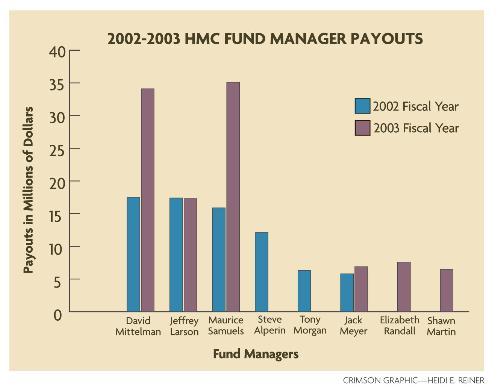
News
Summers Will Not Finish Semester of Teaching as Harvard Investigates Epstein Ties

News
Harvard College Students Report Favoring Divestment from Israel in HUA Survey

News
‘He Should Resign’: Harvard Undergrads Take Hard Line Against Summers Over Epstein Scandal

News
Harvard To Launch New Investigation Into Epstein’s Ties to Summers, Other University Affiliates

News
Harvard Students To Vote on Divestment From Israel in Inaugural HUA Election Survey
Top Fund Managers Net $100M in FY03 Payouts

Harvard’s top six endowment fund managers together earned more than $100 million in salaries and bonuses for the fiscal year ending June 30, 2003, according to figures released yesterday by the Harvard Management Corporation (HMC).
The top two earners—Maurice Samuels and David R. Mittelman—earned $35.1 million and $34.1 million respectively, more than doubling the amounts earned by last year’s top two earners, who took home almost $18 million apiece.
The HMC—the group responsible for managing Harvard’s $19.3 billion endowment—compensates fund managers with a fixed salary, a neutral bonus and a performance-related bonus.
The HMC fund managers’ usually take home a base salary of roughly $400,000, and their annual neutral bonuses are typically in the $100,000-range.
Samuels’ and Mittelman’s dramatic salaries were thus related to last year’s bullish performance of the endowment, which earned 12.5 percent.
Harvard’s performance was four times better than the average return on university endowments. [See related story, page 8]
At $19.3 billion, the endowment is now the largest it has been in the University’s 368-year history.
“This compensation deal is a good deal for Harvard,” said Meyer, one of the top six earners in the HMC. “If we had used external managers and gotten the same results, it would have cost twice as much.”
Unlike most other Ivy League schools, Harvard manages its own endowment.
Due to this year’s considerable bonuses, HMC will consider implementing a new maximum annual compensation for fund managers, Harvard Treasurer D. Ronald Daniel told the Associated Press last night.
It was not clear last night whether these proposed changes would prevent bonuses as large as those Samuels and Mittelman took home this year.
The compensation numbers are usually released in November or December, but Meyer said yesterday that this year’s release was affected by the size of the payout.
“Our numbers are big this year, and we reviewed them carefully and more carefully, and talked about it at several meetings,” Meyer said.
The HMC’s compensation system has been criticized by alumni, who say the group’s earnings policy is too generous.
“Back in the ’90s, there was concern when someone reached one million,” said William Strauss ’69, one of seven members of the Class of 1969 who sent a letter to University President Lawrence H. Summers in November protesting last year’s compensation numbers. “Now it’s 35? What’s the limit? If I were these people, I would give back 30 percent of what Harvard gives me as a gesture.”
The Nov. 25 letter to Summers noted that the $100 million paid to top HMC managers in 2001 and 2002 is the equivalent of “a gift of $70,000 from every member of the Class of 1969.”
Jeffrey Alexander ’69, who also signed the note to Summers, said he has received many letters from concerned alums who heard about the compensation numbers.
“We get letters from people who say, ‘I’m a doctor, I’m a lawyer but donating $500 a year is a big decision for me.’ When this guy is making $30 million a year, it makes [Harvard’s] request for money comical,” he said.
Alexander said he doesn’t think that Meyer’s defense of the system is valid.
“The way that [Meyer] presents his argument is that Harvard is paying less for [the fund managers] than the open market,” Alexander said. “But they don’t have to be rewarded at the same level because they’re not taking the same risk as they would in the real world.”
“It’s like state socialism. We have a huge company that is making huge profits and there’s no danger that it would be fired,” he added.
Meyer attributes the negative reactions to HMC’s pay scale to the company’s reporting policy.
“The reason our compensation package receives so much publicity is because we manage in-house and have to report our compensation numbers,” he said. “Other universities pay more [to their external fund managers]. We know what the pay scale is.”
The alumni said they didn’t receive a response to their letter until yesterday, a wait they say was unacceptable.
“They don’t want to dignify our letter with a response but they want us to give money,” Alexander said. “It’s kind of like a company that doesn’t talk to its shareholders.”
Summers said in an interview in December that he would be “surprised” if the alums didn’t receive a reply before the end of December.
Vice President for Government, Community and Public Affairs Alan J. Stone, who responded to the letter, said, “We normally respond to alumni more quickly but there were a lot of factors that lead to the slight delay.”
He declined to comment further.
Strauss, who is planning to send Summers another letter in response to yesterday’s compensation numbers release, said he was not satisfied with the University’s reply.
“It wasn’t from President Summers. It didn’t respond to our requests,” he said. “We requested a public forum to discuss whether these payments reflect the values of the Harvard community and whether it’s acceptable to Harvard.”
Stone would not comment about Strauss’ proposal.
Strauss said he also received a letter from Harvard Treasurer D. Ronald Daniel yesterday, outlining HMC’s compensation policy.
He said he thinks that all alums should be sent a copy.
“Every alum needs to make their own decision about whether Harvard is a worthy philanthropy when it’s paying $100 million to six individuals,” he said.
—Staff writer May Habib can be reached at be reached at habib@fas.harvard.edu.
Want to keep up with breaking news? Subscribe to our email newsletter.
